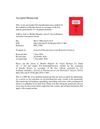 January 2024 in “Jurnal Ilmiah Ibnu Sina (JIIS) Ilmu Farmasi dan Kesehatan”
January 2024 in “Jurnal Ilmiah Ibnu Sina (JIIS) Ilmu Farmasi dan Kesehatan” The F2 hair tonic with shallot extract is effective and stable for hair growth.
 January 2012 in “Elsevier eBooks”
January 2012 in “Elsevier eBooks” New treatments for skin and hair repair show promise, but further improvements are needed.
 5 citations,
January 2022 in “Molecular Medicine Reports”
5 citations,
January 2022 in “Molecular Medicine Reports” Pine bark extract helps mice grow hair by reducing inflammation and boosting growth factors.
 13 citations,
December 2017 in “BMC Complementary and Alternative Medicine”
13 citations,
December 2017 in “BMC Complementary and Alternative Medicine” The Asian herbal mix with Houttuynia cordata, Perilla frutescens, and green tea helped grow hair in mice.
34 citations,
January 2022 in “Molecules/Molecules online/Molecules annual” Natural ingredients in cosmeceuticals are beneficial for skin and hair health with few side effects.
 1 citations,
January 2013 in “Springer eBooks”
1 citations,
January 2013 in “Springer eBooks” Cosmeceuticals may benefit skin health but need more research for efficacy and safety confirmation.
 86 citations,
June 2017 in “Anais Brasileiros de Dermatologia”
86 citations,
June 2017 in “Anais Brasileiros de Dermatologia” Antioxidants can benefit skin health but should be used carefully to avoid negative effects.
 10 citations,
May 2021 in “Expert Opinion on Drug Delivery”
10 citations,
May 2021 in “Expert Opinion on Drug Delivery” Coenzyme Q10 vesicular formulations can potentially treat androgenic alopecia by promoting hair growth and thickness.
February 2023 in “PLOS ONE” Caizhixuan hair tonic helps treat hair loss by promoting hair growth and improving hair follicles.
 24 citations,
November 2018 in “International Journal of Molecular Sciences”
24 citations,
November 2018 in “International Journal of Molecular Sciences” Ethosomes improve drug delivery through the skin but may have side effects like irritation.
 4 citations,
November 2018 in “Journal of Pharmaceutical and Biomedical Analysis”
4 citations,
November 2018 in “Journal of Pharmaceutical and Biomedical Analysis” Roselle flower extracts can protect against free radical damage in UV-irradiated antibiotics.
 16 citations,
April 2017 in “Journal of Cosmetic Dermatology”
16 citations,
April 2017 in “Journal of Cosmetic Dermatology” Ficus carica leaf extract may help treat skin disorders by reducing inflammation and androgen effects in skin cells.
 3 citations,
December 2022 in “Cells”
3 citations,
December 2022 in “Cells” Cannabinoids like CBD and THC may help treat non-cancer skin diseases, but more research is needed.
 47 citations,
September 2015 in “Journal of Drug Delivery Science and Technology”
47 citations,
September 2015 in “Journal of Drug Delivery Science and Technology” Nanoparticulate systems improve drug delivery by controlling release, protecting drugs, changing absorption and distribution, and concentrating drugs in targeted areas.
61 citations,
April 2023 in “Bioactive Materials” Microneedles are effective for painless drug delivery and promoting wound healing and tissue regeneration.
 5 citations,
February 2022 in “Acta Biomaterialia”
5 citations,
February 2022 in “Acta Biomaterialia” Nanomaterials can improve hair care products and treatments, including hair loss and alopecia, by enhancing stability and safety, and allowing controlled release of compounds, but their safety in cosmetics needs more understanding.
 25 citations,
July 2017 in “Archives of Dermatological Research”
25 citations,
July 2017 in “Archives of Dermatological Research” Herbal products might promote hair growth with fewer side effects, but more research is needed to confirm their safety and effectiveness.
35 citations,
November 2021 in “Journal of nanobiotechnology” Thymol-loaded nanoparticles are a promising, natural treatment for acne that avoids antibiotics and preserves healthy skin bacteria.
1 citations,
February 2024 in “Pharmaceutics” Nanovesicles improve drug delivery through the skin, offering better treatment outcomes and fewer side effects.
 4 citations,
August 2022 in “The Scientific World Journal”
4 citations,
August 2022 in “The Scientific World Journal” Merremia peltata leaf extract, particularly the bufotalinin compound, shows potential for treating hair loss.
 1 citations,
January 2018 in “Acta dermatovenerologica Alpina, Pannonica et Adriatica (Tiskana izd.)”
1 citations,
January 2018 in “Acta dermatovenerologica Alpina, Pannonica et Adriatica (Tiskana izd.)” The herbal extract was found to effectively reduce and prevent hair loss without any side effects.
 10 citations,
January 2017 in “Journal of Evidence-Based Complementary & Alternative Medicine”
10 citations,
January 2017 in “Journal of Evidence-Based Complementary & Alternative Medicine” Some vegetables from Northern Thailand show promise for health benefits, including hair loss treatment and antioxidant properties.
1 citations,
February 2024 in “Cosmetics” Cannabidiol shows promise as an effective treatment for acne.
 November 2024 in “Applied Sciences”
November 2024 in “Applied Sciences” Wild strawberry waste extract can be a sustainable cosmetic ingredient for treating acne and hair loss.
 2 citations,
May 2023 in “Nanomaterials”
2 citations,
May 2023 in “Nanomaterials” Microemulsions could improve skin drug delivery but face challenges like complex creation and potential toxicity.
 October 2023 in “Bioactive Materials”
October 2023 in “Bioactive Materials” The new hair loss treatment combining nitric oxide and minoxidil in a special carrier is effective for hair regrowth.
 2 citations,
August 2023 in “Pharmaceutics”
2 citations,
August 2023 in “Pharmaceutics” New skin disease treatments using TDDS are improving but face challenges like side effects and high costs.

Plant-based compounds can improve wound dressings and skin medication delivery.
January 2019 in “The Pharma Innovation Journal” The best mix for a hair loss treatment cream is 10% Sophora japonica tincture and 5% Serenoa repens extract.
 67 citations,
November 2019 in “Molecules”
67 citations,
November 2019 in “Molecules” Tea, especially green tea, shows promise in cosmetics for skin and hair benefits but more research is needed for effective use.























